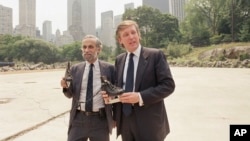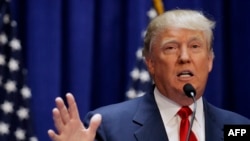After flirting with the idea of running in previous elections, Donald Trump declared his entry into the 2016 presidential race with the flair and bravado the American public was used to seeing from his time as a real estate mogul and reality television host.
"All of my life, I have heard that a truly successful person – a really, really successful person, and even moderately successful – cannot run for public office. It just can't happen. And yet that's the kind of mindset that you need to make this country great again."
With those words on June 16, 2015, Trump joined a crowded field of much more conventional candidates whose backgrounds – being senators and governors -- lead to the White House. National polls showed him in ninth place among the 16 Republican candidates.
David Almacy, a partner at the digital firm Engage who served as internet director under former President George W. Bush, said in the early stages Trump was not seen as being able to govern effectively.
"He was probably not perceived as being someone who could be taken seriously in the beginning, because I think many felt that he was doing it for publicity or maybe just to further his own name and his brand," Almacy told VOA.
Nobody like Trump has ever been elected president of the United States. In the past 150 years, only four men have been elected to the White House without first having served in Congress or as a state governor. One of those was elected after leading the winning side in the U.S. Civil War, another led U.S. troops in Europe during World War II, and the other two first served as Cabinet secretaries.
Republican analyst Paris Dennard said Trump is "unconventional in almost every single way" and wasn't taken seriously by the party's establishment.
"They underestimated his ability, his connectivity with the media, and his acute understanding of the mood of the American people and more importantly, the mood and the sentiments of the GOP base," Dennard told VOA.
Trump surges
But being unconventional helped Trump carve his path to being the Republican nominee.
He proposed building a wall along the U.S. border with Mexico, calling those who enter from that country criminals and rapists. A month into his candidacy, Trump criticized Senator John McCain, who spent more than five years as a prisoner of war in Vietnam.
"I like people that weren't captured," Trump said.
"You would think the average thinking person or the average voter would look at that and say this is not appropriate, but yet he seemed to survive that, and not only did he survive, but he began to surge as a result of some of these off the cuff remarks," Almacy said.
By July 2015, aided by the exposure of his practically daily phone interviews on national news broadcasts, Trump had already pulled 5 points ahead of former Florida Governor Jeb Bush to lead the polls.
He was still in first place in November when he said he wanted surveillance of mosques and in December, when he called for a ban on Muslims entering the U.S.
Dennard said Trump's style was appealing in a climate when polls showed low approval ratings for Congress and highly negative views of Democratic candidate Hillary Clinton.
"When somebody like that comes on the scene you see enthusiasm," he said.
Path to the nomination
Voters had their first say in the race in February when Trump narrowly lost the Iowa caucus to Texas Senator Ted Cruz. But he gained momentum in the weeks that followed by winning in New Hampshire and South Carolina, at which point Bush dropped out of the race.
March began with another string of wins that raised alarms among some major Republican figures who feared what would happen if Trump actually became the party's nominee.
Mitt Romney, the 2012 nominee who lost to incumbent President Barack Obama, gave a scathing speech in which he said picking Trump would only clear the way for Clinton to win.
The next day, retired neurosurgeon Ben Carson left the race. Florida Senator Marco Rubio, considered one of the stronger candidates in the Republican field, dropped out on March 15 after Trump crushed him in his home state.
Efforts to stop Trump gathered more urgency, and in April, his two remaining rivals announced a pact designed to prevent him from earning the majority of delegates needed to clinch the nomination.
Ohio Governor John Kasich said he would essentially cede the primary in Indiana to Cruz in exchange for Cruz stepping aside in Oregon and New Mexico. The result was a disaster for both of them; Trump won all three states and cemented his status as the Republican nominee.
Dennard said if those in the "Never Trump" movement had wanted to succeed, they should have considered Trump a serious candidate and acted within the first two to three months.
'Time to unify'
Almacy, who backed Bush and later Kasich, said he has never seen the type of opposition to a candidate that persists against Trump.
"I don't think that these efforts are personally geared toward wishing him ill will. It's just that a number of us don't believe that he will be a good president, and in fact, he will not be a good leader for the country and will put us in peril," he said.
But while some major Republican figures are skipping the party's convention and making no commitment to vote for its nominee, others have slowly moved to endorse him. Those include House Speaker Paul Ryan, who was initially noncommittal but said in early June that he will vote for Trump.
"I think that from a party standpoint it's time to unify," Dennard said, "and I think the RNC [Republican National Committee] and a lot of senators and congressman realize the fact that, at the end of the day, in order to beat Hillary Clinton we have to have a unified GOP. And I think that they have made strong efforts to do so."













